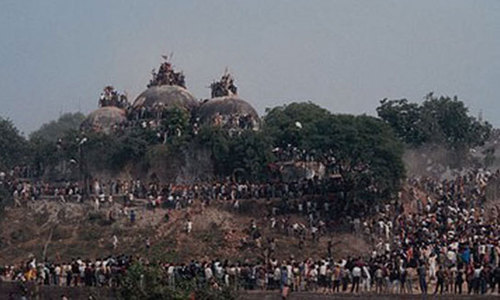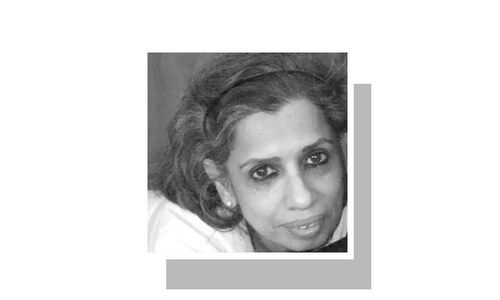KARACHI: From the controversial and fateful storming of the Golden Temple in Amritsar to the aftermath of Indira Gandhi’s assassination to the demolition of the Babri Mosque in Ayodhya, Indian President Pranab Mukherjee has been privy to many significant events in Indian history.
In the second volume of his memoirs — “The Turbulent Years: 1980-96”, released this week by Vice President Hamid Ansari — he has revealed what transpired behind the scenes during such events.
In his book, the Indian president termed the inability to prevent the demolition of the Babri Mosque in 1992 one of P.V. Narasimha Rao’s biggest failures as prime minister.
He also talks about how the incident “deeply wounded the sentiments of the Muslim community in India and abroad.
“The demolition of the Babri Masjid was an act of absolute perfidy, which should make all Indians hang their heads in shame. It was the senseless, wanton destruction of a religious structure, purely to serve political ends. It deeply wounded the sentiments of the Muslim community in India and abroad.
“It destroyed India’s image as a tolerant, pluralistic nation where all religions coexist in peace and harmony,” he writes.
“In fact, the foreign minister of an important Islamic country later pointed out to me that such damage had not been inflicted on a mosque even in Jerusalem, which has seen religious conflicts for centuries.”
Talking about the Operation Blue Star in 1984 to flush out terrorists from the Golden Temple, he has recalled that then prime minister Indira Gandhi “understood the situation well and was clear that there was no other option. Aware that her own life was at risk, she took a conscious decision to go ahead in the best interest of the nation”.
“It can easily be said that the military operation could have been avoided. However, nobody really knows if any other option would have worked,” he says.
“Such decisions are always taken based on the conditions prevailing at that time. The situation in Punjab was abnormal. Urgent action was needed to put an end to the indiscriminate killings, the misuse of religious sites for terrorist activities and all efforts to break up the Indian union.”
About the aftermath of Mrs Gandhi’s assassination, Mr Mukherjee writes: “After some time, he (Rajiv) came back and announced, ‘She is dead.’ There was absolute silence. Tears started rolling down my face, and I wept inconsolably, managing to compose myself only after some time and with great effort.
“Rajiv was exceptionally calm and displayed total control and fortitude, possibly a trait he had inherited from his mother.”
Explaining how the party stalwarts decided to elevate Rajiv Gandhi to the post of prime minister, the Indian president says: “Once we were able to regain some semblance of composure, we began discussions on what was to be done next. Balram Jakhar, Ghani Khan Choudhury, Shyamlal Yadav, Uma Shankar Dikshit and Sheila Dikshit (Congress leaders) started discussing the future course of action amongst themselves, and I joined in a bit later....
“At the conclusion of the discussion, it was decided that we should request Rajiv Gandhi to take over as the full-fledged prime minister to meet the challenge posed by this extraordinary situation. Somebody suggested that I formally make this request to Rajiv and work out the modalities to be followed. I took Rajiv to the rear of the aircraft and requested him to take over as prime minister. His immediate question to me was, ‘Do you think I can manage?’
“‘Yes,’ I told him, ‘we are all there to help you. You will have everyone’s support’.”
In his book, Mr Mukherjee has also sought to dispel a perception that he aspired to become interim prime minister after Mrs Gandhi’s assassination, terming these stories as “false and spiteful”.
Mr Mukherjee also says he was left “shell-shocked and flabbergasted” at his ouster from Rajiv Gandhi’s cabinet.
Talking about circumstances that led to his ouster from the cabinet and then from the party, he says: “To the question of why he dropped me from the cabinet and expelled me from the party, all I can say is that he made mistakes and so did I.”
After his expulsion from the party in April 1986, Mr Mukherjee formed Rashtriya Samajwadi Congress. He returned to Congress in 1988.
Published in Dawn, January 31st, 2016















































